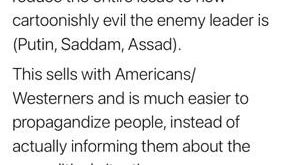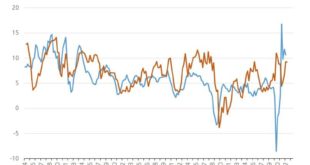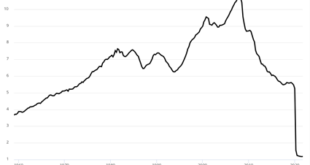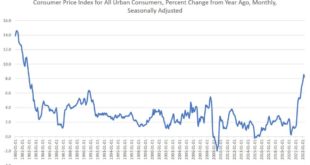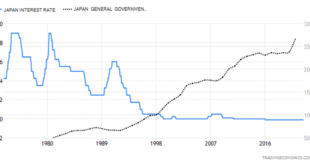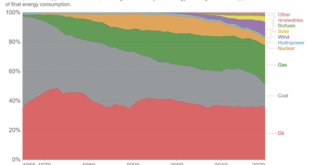Proponents of arming Ukraine against Russia call critics “isolationists” as a pejorative term. But these “entangling alliances” have a history of sad endings with tragic results. Original Article: “Noninterventionism Is Not Isolationism: The US Government Should Stop Arming Ukraine” Libertarians, liberty-wing Republicans, and other opponents of nondefensive wars are popularly misconceived as having an “every man for himself” approach to both economics and...
Read More »The Russo-Ukrainian War: A New Opportunity for Demagogues to Destroy Freedoms at Home
Politicians thoroughly enjoy times of war. Periods of bellicosity are when the most power-hungry members of the political class indulge in their most depraved political fantasies. The Russo-Ukrainian War has been no exception to this trend. Western politicians have been taking advantage of the largest conventional military conflict on European soil since World War II to crack down on civil liberties at home and drag their countries closer to an open conflict with a...
Read More »Federal Reserve Policies Aimed at Creating Price Stability Bring About Economic Instability
For most economists and politicians, the role of central bank authorities is to make the economy as stable as possible. What do they mean by economic stability? Economic stability refers to an absence of excessive fluctuation, so an economy with constant output growth and low and stable price inflation is likely to be regarded as stable. An economy with frequent boom-bust cycles and variable price inflation would be considered unstable. According to popular thinking,...
Read More »Freedom and Sound Money: Two Sides of a Coin
It is impossible to grasp the meaning of the idea of sound money if one does not realize that it was devised as an instrument for the protection of civil liberties against despotic inroads on the part of governments. Ideologically it belongs in the same class with political constitutions and bills of right. So wrote Ludwig von Mises in The Theory of Money and Credit in 1912. And further: The sound-money principle has two aspects. It is affirmative in approving the...
Read More »The Fed Gets It Wrong on Money Velocity, Too
Money velocity’s role in forcing up prices is misunderstood because today’s monetary “authorities” fail to consider how new money is injected into the economy. Original Article: “The Fed Gets It Wrong on Money Velocity, Too” “Inflation” is on everyone’s lips. Commentators and politicians are quick to point out the perpetrators. It is said that climate change is the cause of rising prices or that a specific war maker is to blame. A popular opinion holds that...
Read More »War, Sanctions, and Sanity: A Purely Hypothetical Inquiry
Dealing with specific geopolitical circumstances can be messy. We may disagree on the facts and on which sources are reliable, making it hard to make any headway in a discussion. This may be further compounded by extreme emotions we may have about that situation. The advantage of purely theoretical inquiry is that we can stipulate the facts so as to make the analysis as simple as possible, and avoid much of the emotional baggage that stymies understanding. Once we...
Read More »Real Wages Fall Again as Inflation Stays Near 40-Year Highs
Inflation is so high in America that we’re now supposed to believe that inflation is “moderating” if it doesn’t go above 8.5 percent. That, at least, was the message in much of the speculation yesterday around what April’s CPI inflation numbers would show. Much of the “consensus” was that inflation would come in around 8 percent, and that inflation overall had peaked and is therefore moderating. It’s too early to know if inflation has peaked, but one thing if for...
Read More »Stagflation Comes from Exorbitant Money Creation and Unhampered Government Spending
Too much government spending and loose monetary policy lead to rising prices combined with falling economic growth rates. All Keynesian roads lead to stagflation. It is the result of economic mismanagement. Again and again, the belief has been proven wrong that central bankers could guarantee the so-called price stability and that fiscal policy could prevent economic downturns. The present crisis is one more piece of evidence that interventionist monetary and fiscal...
Read More »Student Loans and Government Subsidies: Another Government “Benefit” Creates Financial Chaos
The origins of the federal student loan program are well documented and follow a similar trajectory to most government subsidy programs in American history. Each previous government subsidy program has had a history of mismanagement, inefficiency, backwards incentives, and inflationary pressure via creation and distribution of new dollars in exchange for goods and services at rates below their market value. The federal takeover of student loans is a subsidy because...
Read More »Lighting the Gas under European Feet: How Politicians and Journalists Get Energy So Wrong
“We live in a time where few understand how things get made. It is fine to not know where stuff comes from, but it isn’t fine to not know where stuff comes from while dictating to the rest of us how the economy should be run.” —Doomberg Eighty-five percent of human energy usage comes from burning things. Either plants or trees grown in a geologically recent past or plants or trees (and decomposed animals) from ancient times. Solar, wind, hydro, geothermal, etc.—all...
Read More » Swiss Economicblogs.org
Swiss Economicblogs.org

